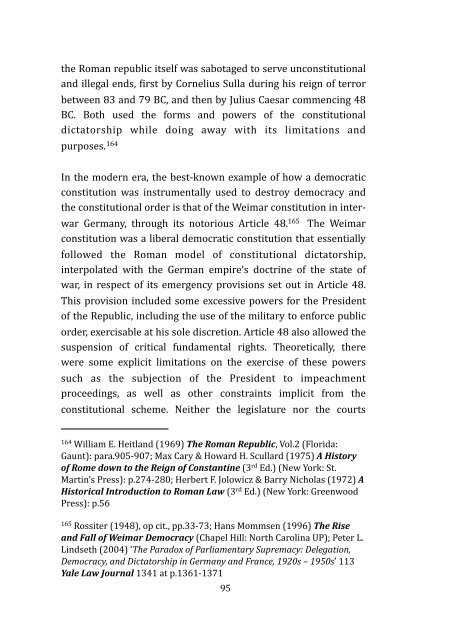States of Emergency - Centre for Policy Alternatives
States of Emergency - Centre for Policy Alternatives
States of Emergency - Centre for Policy Alternatives
You also want an ePaper? Increase the reach of your titles
YUMPU automatically turns print PDFs into web optimized ePapers that Google loves.
the Roman republic itself was sabotaged to serve unconstitutional<br />
and illegal ends, Lirst by Cornelius Sulla during his reign <strong>of</strong> terror<br />
between 83 and 79 BC, and then by Julius Caesar commencing 48<br />
BC. Both used the <strong>for</strong>ms and powers <strong>of</strong> the constitutional<br />
dictatorship while doing away with its limitations and<br />
purposes. 164<br />
In the modern era, the best‐known example <strong>of</strong> how a democratic<br />
constitution was instrumentally used to destroy democracy and<br />
the constitutional order is that <strong>of</strong> the Weimar constitution in interwar<br />
Germany, through its notorious Article 48. 165 The Weimar<br />
constitution was a liberal democratic constitution that essentially<br />
followed the Roman model <strong>of</strong> constitutional dictatorship,<br />
interpolated with the German empire’s doctrine <strong>of</strong> the state <strong>of</strong><br />
war, in respect <strong>of</strong> its emergency provisions set out in Article 48.<br />
This provision included some excessive powers <strong>for</strong> the President<br />
<strong>of</strong> the Republic, including the use <strong>of</strong> the military to en<strong>for</strong>ce public<br />
order, exercisable at his sole discretion. Article 48 also allowed the<br />
suspension <strong>of</strong> critical fundamental rights. Theoretically, there<br />
were some explicit limitations on the exercise <strong>of</strong> these powers<br />
such as the subjection <strong>of</strong> the President to impeachment<br />
proceedings, as well as other constraints implicit from the<br />
constitutional scheme. Neither the legislature nor the courts<br />
164<br />
William E. Heitland (1969) The Roman Republic, Vol.2 (Florida:<br />
Gaunt): para.905‐907; Max Cary & Howard H. Scullard (1975) A History <br />
<strong>of</strong> Rome down to the Reign <strong>of</strong> Constantine (3 rd Ed.) (New York: St.<br />
Martin’s Press): p.274‐280; Herbert F. Jolowicz & Barry Nicholas (1972) A <br />
Historical Introduction to Roman Law (3 rd Ed.) (New York: Greenwood<br />
Press): p.56<br />
165<br />
Rossiter (1948), op cit., pp.33‐73; Hans Mommsen (1996) The Rise <br />
and Fall <strong>of</strong> Weimar Democracy (Chapel Hill: North Carolina UP); Peter L.<br />
Lindseth (2004) ‘The Paradox <strong>of</strong> Parliamentary Supremacy: Delegation, <br />
Democracy, and Dictatorship in Germany and France, 1920s – 1950s’ 113<br />
Yale Law Journal 1341 at p.1361‐1371<br />
95











